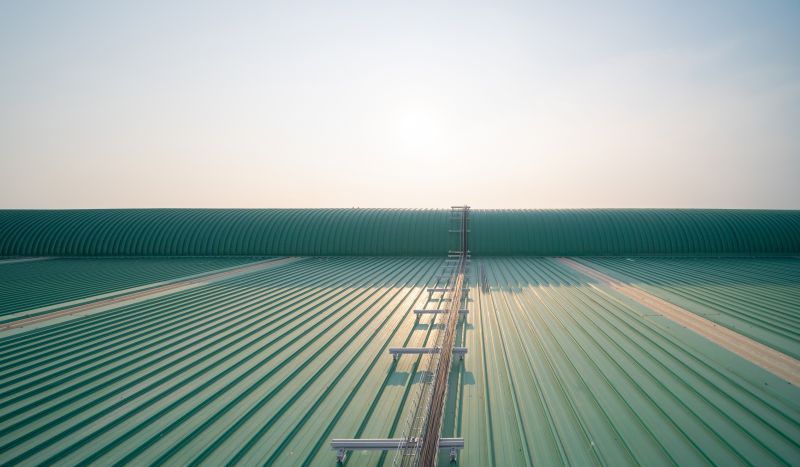Expert Picks for Industrial Roof Installation Products and Supplies
Explore essential products selected by industry professionals to optimize your industrial roofing projects with quality and performance.
 Industrial roof installations require specialized products designed to withstand demanding conditions and ensure long-term performance. The selection of appropriate materials and equipment is essential for maintaining structural integrity, preventing leaks, and facilitating maintenance. From protective coatings to fastening systems, each component plays a vital role in the overall durability of an industrial roof. Proper installation practices and high-quality products can help minimize downtime and reduce the need for frequent repairs.
Industrial roof installations require specialized products designed to withstand demanding conditions and ensure long-term performance. The selection of appropriate materials and equipment is essential for maintaining structural integrity, preventing leaks, and facilitating maintenance. From protective coatings to fastening systems, each component plays a vital role in the overall durability of an industrial roof. Proper installation practices and high-quality products can help minimize downtime and reduce the need for frequent repairs.
Top Overall Option
Industrial Roof Coating System
A comprehensive industrial roof coating system offers a protective layer that can enhance the durability and lifespan of existing roofs. These systems typically include a primer, multiple coating layers, and sealants designed to resist weathering, UV damage, and chemical exposure. They are suitable for various roofing substrates and can be applied over existing materials, reducing the need for complete replacement. Properly selected coating systems can provide a seamless, waterproof barrier that helps prevent leaks and minimizes maintenance requirements.
Types of Products For Industrial Roof Installations
Roofing Membranes
Flexible sheets made from materials like EPDM, TPO, or PVC, used to create waterproof and weather-resistant roofing surfaces.
Metal Roofing Panels
Durable metal sheets designed for industrial applications, offering longevity and resistance to harsh conditions.
Roof Coatings
Protective layers applied over existing roofs to improve waterproofing and extend service life.
Insulation Materials
Insulation panels and foams that enhance thermal performance and energy efficiency of industrial roofs.
Fasteners and Anchors
Specialized screws, bolts, and anchors designed to securely attach roofing materials to structural supports.
Sealants and Adhesives
High-performance sealants and adhesives that ensure watertight joints and secure bonding of roofing components.
Drainage Systems
Gutters, scuppers, and drainage pipes that facilitate efficient water runoff from large roof surfaces.
Vapor Barriers
Materials used to prevent moisture infiltration and protect insulation and structural components.
Walkway Pads
Non-slip pads that provide safe access points for maintenance personnel on industrial roofs.
Roof Hatches
Access points designed for safe entry and exit for maintenance and inspection activities.
Snow Guards
Devices to prevent snow and ice from sliding off large roof surfaces, ensuring safety.
Lightning Protection Systems
Systems installed to safeguard the structure against lightning strikes.
Ventilation Equipment
Fans, vents, and exhaust systems that promote airflow and help regulate temperature inside the building.
Flashing and Edge Metal
Metal components that seal roof edges and penetrations, preventing water infiltration.
Roof Anchors
Secure attachment points for safety harnesses and fall protection systems.
Popular Choices
Versatile rubber membranes favored for their flexibility and weather resistance in industrial settings.
Thermoplastic polyolefin sheets known for ease of installation and reflective properties.
High-performance insulation material providing thermal resistance and lightweight support.
Popular for their durability and ease of installation on large industrial roofs.
Asphalt-based coatings used to reinforce and waterproof existing roofs.
Robust screws and bolts designed for secure attachment in demanding environments.
Sealants that provide reliable waterproofing around penetrations and joints.
Efficient systems for managing water runoff on large roof surfaces.
Materials that prevent moisture migration and protect insulation layers.
Secure, weather-tight hatches providing safe access for maintenance.
Equipment designed to hold snow in place and prevent dangerous slides.
Protection systems installed to divert lightning strikes safely.
Ventilation solutions to improve airflow and temperature regulation.
Complete flashing solutions for roof penetrations and edges.
Secure points for harnesses, ensuring safety during roof work.
When considering products for industrial roof installations, factors such as weather resistance, compatibility with existing structures, ease of application, and longevity are critical. Materials must be capable of handling exposure to harsh elements like heavy rain, wind, and temperature fluctuations. Additionally, ease of installation can significantly impact project timelines and labor costs, making user-friendly products highly desirable.
Industrial roofing solutions often include a variety of accessories and supplementary items that support the primary roofing material. Sealants, insulation, fasteners, and drainage components are integral to creating a reliable and efficient roofing system. Selecting products that are designed to work together can enhance overall system performance and simplify maintenance procedures. Consulting with professionals and adhering to industry standards can further ensure the success of a roofing project.
Investing in high-quality, durable products for industrial roof installations can contribute to the safety and functionality of industrial facilities. While the initial investment may be higher, the long-term benefits of reduced repairs, improved energy efficiency, and enhanced protection can be substantial. Staying informed about the latest product innovations and best practices will help ensure that your industrial roofing system remains resilient over time.
Key Buying Considerations
- Compatibility with existing roofing materials and structures
- Weather resistance and durability in harsh conditions
- Ease of installation and maintenance requirements
- Material lifespan and warranty coverage
- Thermal performance and insulation properties
- Waterproofing capabilities and leak prevention features
- Compatibility with safety and fall protection systems
- Ease of sourcing replacement parts or materials
- Cost-effectiveness over the long term
- Compliance with industry standards and building codes
- Resistance to chemical exposure or industrial contaminants
- Weight and structural load considerations
- Availability of technical support and installation guidance
- Environmental factors such as UV exposure and temperature fluctuations
- Potential for future upgrades or modifications
